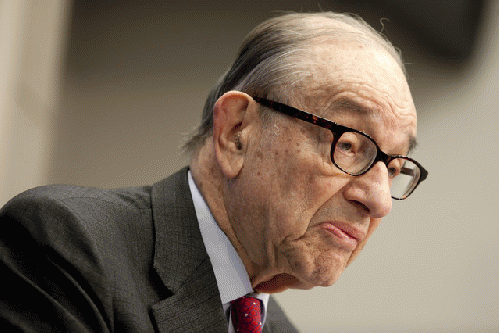The economies of the United States and Europe are seeing their worst downturn since the Great Depression. Tens of millions of people are unemployed or underemployed. This has led to millions losing their homes, their access to health care and, in some cases, their lives.
Remarkably, the two individuals who bear the greatest responsibility for this disaster, former Federal Reserve Board chairman Alan Greenspan and former president of the European Central Bank Jean-Claude Trichet, do not appear to be suffering at all for their failure. Both are living comfortably and continue to be sought out for their expertise on economic policy. This should infuriate reasonable people everywhere.
At this point everyone should understand that the economic wreckage destroying tens of millions of lives across the globe was an entirely preventable disaster. In the case of both the United States and Europe unsustainable asset bubbles were allowed to grow to ever more dangerous levels. It was inevitable that the bubbles would burst and when they did the outcome would be a severe downturn from which it would not easy to recover.
In the case of the United States the story was a housing bubble that resulted in an unprecedented run-up in house prices. After just keeping pace with inflation for a hundred years, nationwide house prices rose by more than 70 percentage points in excess of the rate of inflation over the decade from 1996 to 2006.
There was nothing in the dynamics of the supply and demand of the housing market that could have justified such an increase. Rents were going nowhere and there was a record high vacancy rate as early as 2002. More importantly, the bubble was clearly driving the economy with near record rates of residential construction from 2002-2005. And housing wealth driven consumption pushed the saving rate to nearly zero from 2004-2007.
Of course these sources of demand would disappear when the bubble burst. What did Greenspan think would replace them? We may never know what Greenspan was thinking, but what he has said in his own defense is utterly absurd. In fact he told the Washington Post that he did not even know of the explosion of subprime lending until his last month as Fed chair in January 2006. If that is actually true it displays a level of incompetence that puts a drunken school bus driver to shame.
Greenspan should have been attacking the bubble with everything in his vast arsenal. Most immediately, he should have been using the research of the Fed and his megaphone as Fed chair to warn the country about the bubble in unmistakable terms. (He actually did the opposite, denying the existence of a bubble and encouraging people to take out adjustable rate mortgages.) He also should have used his regulatory authority to crack down on bad mortgages. If both of these tools failed, he should have raised interest rates. This would have slowed the economy and increased unemployment, but it was better than the disaster we are seeing now.

European Central Bank president Jean-Claude Trichet (Thomas Lohnes/AFP/Getty Images)
Trichet doesn't have any better defense. The bubbles in the peripheral countries were leading to trade imbalances that were clearly unsustainable. As early as 2004 the current account deficit in Spain was already 5.2% of GDP, in Greece it was 5.8% of GDP and in Portugal it was 8.3% of GDP. These deficits peaked in 2007-2008 at 10% of GDP or higher. How did Trichet think that deficits of this size would resolve themselves in a single currency? What was the process whereby the peripheral countries would suddenly be able to pay for their imports from the core countries? If he envisioned some mechanism for this adjustment that didn't involve an economic earthquake, it is difficult to imagine what it could have been.
European Central Bank officials are prone to say in their own defense that their mandate is only to target 2% inflation; it doesn't say anything about preventing depressions. Interestingly the ECB did not take this narrow view of its mandate when the euro zone's largest banks faced insolvency in the fall of 2008. It came through with trillions of euros of below market loans.
The reality is that a central bank has to be responsible for maintaining economic stability as the ECB has implicitly acknowledged with its actions since the onset of the crisis. This means the ECB has no more excuse for failing to stem the imbalances of the last decade than does the Fed.
This raises the question of why the public should be paying for the generous pensions that both Greenspan and Trichet enjoy. After all, if Greenspan and Trichet had tried to burn down their respective institutions, would we be paying their pensions? Given the consequences of their policy failures, we would be much better off if they had done their done their jobs competently and our only complaint was an incident of arson.
Economists believe that it is important that workers be given incentive for good work and punished for bad work. It would be hard to imagine central bankers more in need of punishment than Greenspan and Trichet. If we don't take action against these two, why would we expect that their successors will be any better?






